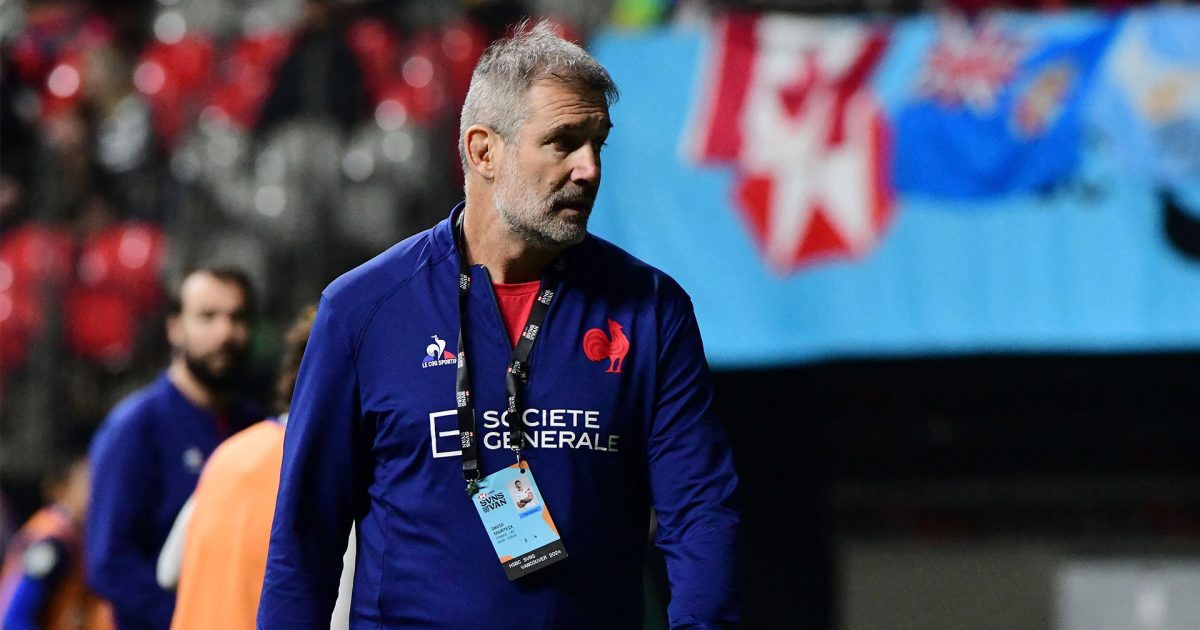France sevens head coach David Courteix: 'We have to look for luck'

At the start of the season, France 7 Women’s coach David Courteix spoke to RugbyPass about ‘the statistical anomaly that we haven’t won yet’.
As the season comes to a close with the tournament in Madrid from 31 May to 2 June, France 7 Women can look back on a record season with four podium finishes and four medals: two bronze (Dubai and Singapore) and two silver (Cape Town and Vancouver). But once again, no gold. With this third place overall, the ‘anomaly’ continues.
“This third-place finish rewards a certain level of consistency throughout the season in all the tournaments,” Courteix told RugbyPass. “It’s the first time we’ve played in a competition with such a high number of places, even though we missed out on a couple of quarterfinals.
“We have always been there for the big moments when people expect us to perform. But to be honest, in the World Series we’ve often been victims of our ability to be good on one event and not so good on another.”

Breaking the glass ceiling… “soon”
The last tournament in Madrid will be an important factor, and France 7 Women is hoping to finally break the glass ceiling that has hung over the team since it entered the World Series.
“We’re one of the teams that’s still playing at a high level and haven’t won yet,” said Courteix.
“To win you have to seize your chances. And today, when it comes to taking the ball off the bounce, we’re still a bit lacking in the belief that it’s going to come down to us. We know we can do it, but we’re not taking that final step in terms of behaviour, attitude and mental belief that we can do it. We’re missing a few things.”
As a fan of Claude Fauquet – the “coach of coaches”, and a former sports teacher who has gone on to be a consultant at the highest level in a few sports – Courteix likes to quote the high-performance theorist: “In the end, the person who wins is the one who has managed to escape the path laid out for him by others. It is also the person who has shown a greater desire to succeed than others and who has translated this into his or her performance”.
It’s the famous “they were hungrier than we were” line, systematically repeated by the team that has just been beaten.
But for Courteix, that’s the paradox of the French women’s rugby sevens team: they have all what’s necessary to be champions, but they’re just not clicking.
“We don’t always take our chances,” he insists. “We have all the weapons. We just have to put them all together. Does that worry me? Not at all. Do I think we’ve been close for a long time? Yes. We’re getting closer every time.
We’re closer than ever. And I hope it will happen as soon as possible.”
France not yet convinced
The trigger that France needs to activate lies in their mindset; the killing mindset that they need to have. If they have missed out on being champions of the World Series, they will at least be doing everything they can to become European champions between now and the Olympics, where they hope to return home with a medal.
Although Les Bleues know they are capable of doing so, according to their coach, they now need to be “convinced”.
“For me, there is a big difference between luck and chance. For me, luck is something you can control and it’s a force of conviction, total commitment and the desire to win, to take control of events,” he explains.
“In this area, we’re less sure that we can control our luck than teams like Australia or New Zealand. It’s probably harder for us in France because of cultural issues. People say we can come across as arrogant and pretentious. On the contrary, I don’t think that’s what this team comes across as at all. And sometimes it’s counterproductive.
“We’re not pretentious, but maybe it’s a sign that sometimes we believe that luck will come our way. And in my opinion, you have to look for luck. Chance is something else, it’s random. Nothing happens by chance in sport. We have to accept that and make the most of our opportunities.”
“Philippe Saint-André and Serge Blanco, for example, are two players who, in the history of French rugby, were said to be the ones who got all the rebounds; whenever there was an unlikely interval to be taken, it was for them. Well, having spent a lot of time watching them, they were people who chased every ball, every rebound and every break. And then, when it opened up, you remembered that it had smiled on them; but because they had tried thousands of doors and rebounds before!
“And that’s where belief comes in. If you believe your luck is at the end of the road, you’ll explore every possibility. If you wait for your luck to run out, you’ll lack the conviction that means you’ll miss your chance.”
New tickets for Women’s Rugby World Cup 2025 are now available, with prices starting at £10 for adults and £5 for children. Buy now!
































